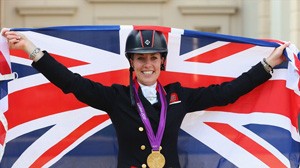
The London 2012 Olympic Games will be remembered for a major shift in Equestrian sport's balance of power
The traditional Olympic forces such as Germany and the Netherlands still excelled, with Germany taking home only one gold medal fewer than Great Britain.
But it was the Host Nation that left a lasting impression at Greenwich Park. Five Equestrian medals – two above target – was the team's best performance in Olympic history.
Before London 2012, Great Britain had never won an Olympic Dressage medal, but they are now double gold medallists through their team of Charlotte Dujardin, Carl Hester and Laura Bechtolsheimer.
The 27-year-old Dujardin also won the Individual title and set three Olympic records for good measure.
Germany had won seven Dressage Team titles in succession, yet despite strong performances by Helen Langehanenberg, Kristina Sprehe and Dorothee Schneider, they had to settle for silver.
The Netherlands took Individual Dressage silver thanks to Adelinde Cornelissen, who was beaten only by Dujardin's brilliance in a competition when Anky van Grunsven's double Olympic champion Salinero made his farewell appearance before retirement. Bechtolsheimer took the bronze for Britain.
When it came to Eventing, there was no doubting Germany's dominance.
They arrived as European champions and duly swept to Team and Individual gold, spearheaded by Michael Jung.
Jung is now the only eventer in history to hold Olympic, world and European titles simultaneously, although his Individual mission would have ended in silver had Swede Sara Algotsson Ostholt not knocked down the final jumping fence.
Jung's German colleague Sandra Auffarth won Individual bronze, and they were joined by Peter Thomsen, Ingrid Klimke and Dirk Schrade to deny Great Britain the Team gold, with New Zealand and 56-year-old double Olympic champion Mark Todd third.
Perhaps the Equestrian schedule's most exhilarating showcase came in the Team Jumping.
It all boiled down to an 'extra time' jump-off between Great Britain and the Netherlands, and it was the British quartet of Nick Skelton, Ben Maher, Scott Brash and Peter Charles that prevailed, landing the country's first Jumping gold for 60 years.
The event was equally as notable for heavyweights Germany, France and Belgium being eliminated in round one, and also the continued emergence of Saudi Arabia as a world force being underlined by a team bronze.
